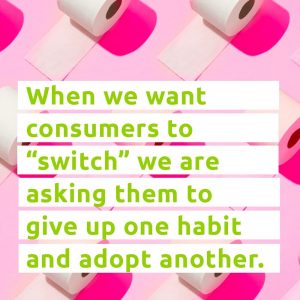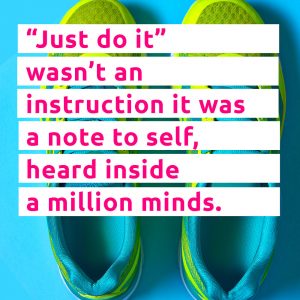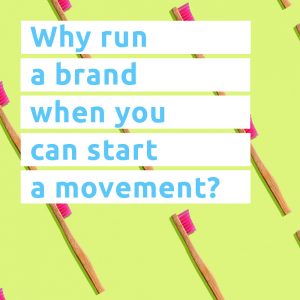Habits worth believing in…
Bluemarlin’s Business as Unusual series offers insight and direction on how brands can emerge stronger, more engaging and absolutely essential in the New Normal.
Last week, a client told us how he was motivated by our latest Brave Talk article on Positive Contagion. He had begun to rethink his brands’ purpose and start some “positivity-planning”. But he couldn’t help but ask… “What will a post-Covid crisis world look like, what will it mean for the trends you’ve been talking about at bluemarlin?”. He wasn’t the first to ask us. I was poised to revisit and revaluate all the trends we’ve been identifying and analysing for the last few years. But the next morning I was rerouted by an irritating newsletter in my inbox that called for a rethink and this article.
The mail in question was a daily “postcard” from a global luxury travel magazine. Since lockdown, with their raison d’etre seriously undermined, they’d been torturing me with beautiful images of wonderful places I couldn’t visit for the foreseeable future, inviting me to “travel without leaving home”. But their latest article went way further in annoyance-miles. Entitled “10 Positive life long habits to adopt while in lockdown” it included “Bring the tropics to the northern hemisphere” (which involved up-cycling a pineapple head into a gorgeous table centrepiece), “Clean up your cleaning routine” (by using vinegar and baking soda to minimise my toxic footprint) and“Reduce your food waste” (by opening tins of food from the back of my cupboard). It was trying to be light-hearted. A fun list of “new routines”. But it was meaningless, uncreative and moreover, totally misunderstood the concept of habit.

Advertising and marketing, in its attempt to drive behavioural change, is all about habit. When we want consumers to “switch” we are asking them to give up one habit and adopt another. However, our food choices, personal care choices, leisure choices, shopping choices, being habitual, are almost always completed in “auto-pilot” mode. Without dumbing down the neuropsychology here, habits are the brains way of taking short cuts to minimise the energy needed to survive and prosper. We therefore need to complete our habits almost without thinking. The three-step “habit loop” begins with a “cue”. This triggers your brain to go into the “routine”. Finally comes the “reward”. Like the “cue” and the “routine”, the “reward” can be physical or psychological.
Brand communication follows this same “loop”. Advertising and packaging are usually the “cue” but also often promise the “reward”. And of course, they can also dramatise the “routine” (depicting that fun night out or the joy of washing your hair in all that gorgeous foam).
But it’s the element of “reward” that is most vital. The depth and power of the reward determines whether your brain will validate the loop and make it worth remembering for the future. Big and important rewards, re-looped and reinforced, become deeply imbedded habits. At this point the “cue” and the “reward” become intertwined as the same “happy chemicals” associated with getting the “reward” actually start being released in the brain at the time of the “cue”. The virtuous or negative circle is complete. It’s what we call “craving”. The sight of that beautiful cold bottle of beer, glistening in the fridge, literally stimulates a Friday night feeling.

Although habits can amount to simply following instructions or suggestions, they only endure when they are part of something meaningful in terms of our survival, our values or our life’s purpose. Brands, just like governments, can engineer new “cues”, “rewards” and encourage new “routines”, but long term behaviour change relies on something far deeper. Belief. Only when we believe in the possibility of change, a different life, a different world, with different rewards, can a new habit loop become permanent.
But there’s a much bigger prize out there for brands, one that has always existed. The positive power of “group think”. When a community shares a sharply defined set of beliefs, the atomic habits of the “me” become the shared behaviours of “us”. But you can’t simply make this up out of thin air. You have to, as they say, take people with you.
At their best habits fuel movements. The daily jog is a positive habit. Nike turned it into a movement. But “Just do it” wasn’t an instruction it was a note to self, heard inside millions of minds. We are tribal. So are great brands.
So to our client I say this. Sure you can think about your “cues” and the “routines” you want consumers to adopt. New habits made or old ones cemented. But what about the genuine “rewards” your brand can offer? Something more fundamentally human above the mere physical and functional? And more importantly, how does your brand represent a set of beliefs, a view of the world, a collective spirit that people can literally “buy into”, forming a community defined by its habits?
Global crises have a habit of being followed by major cultural and social change. From the ashes of WWII came pop culture and rock ‘n’ roll.
So…

Business As Unusual Series
